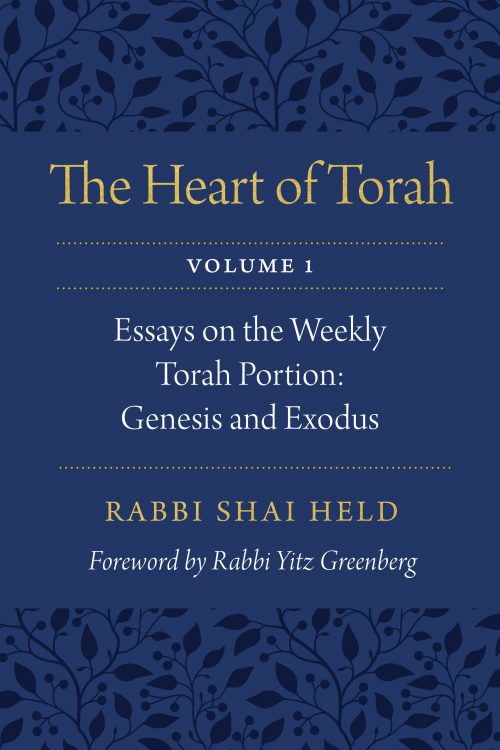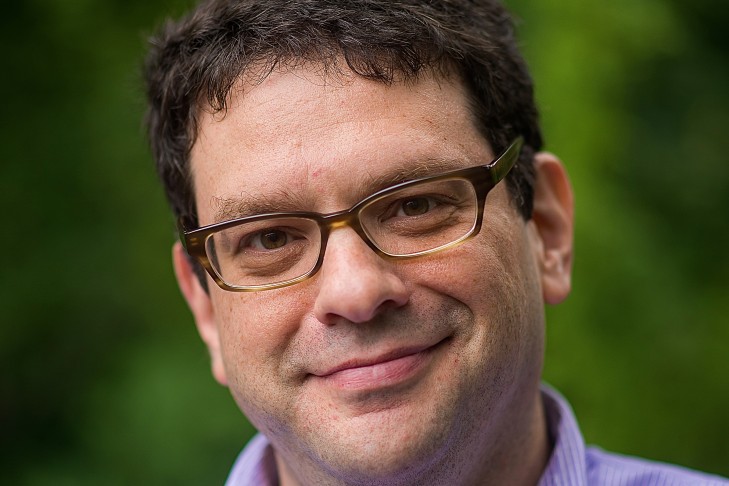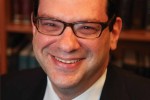It’s been almost a decade since Rabbi Shai Held rediscovered and fell in love with the Bible. A beloved and sought-after teacher, Held recalled that he was in a meeting with his colleagues when someone asked if there was an instructor available to teach a course that combined “modern biblical studies with a deep commitment to reading the text as Torah.”
Held “impulsively” volunteered to teach the course. “It was a dramatic shift for me,” he said in a recent telephone interview with JewishBoston. Held is the author of an impressive and innovative two-volume book of essays that comment on the weekly Torah portion. “The Heart of Torah” grew out of Held’s desire to “do a deep-dive into the chumash [Bible] in a way I had never seen done before.”
Prior to publication, over 7,000 subscribers viewed the essays. As Held has entered the field of Torah explication, he maintains that his volumes are distinctive for the ways in which they bring in many voices to illuminate Torah passages. “My commentary differs from others in the sheer range of who I bring into a shared conversation,” he said. “While I draw on midrash and medieval Jewish commentary pretty extensively, I also bring in the world of modern academic scholarship. Some of that scholarship has been written by devout Christian writers. I’m creating a conversation among all of [my sources] and trying to draw out what the text might be saying to us in the present day.” Some of the highlights for Held of compiling the volumes were the realization of what he called “the intertextuality in the Bible.” For each Torah portion, there are two essays of commentary that take into account the ways in which biblical texts talk to each other. He cites a powerful example from the Book of Exodus. The second book of the Torah begins with the Egyptians forcing the Israelites to erect buildings. It ends with the voluntary construction of the mishkan, or holy tabernacle. Held points out that in the beginning the Israelites answered to a cruel taskmaster who degrades them, but by the end they are in a relationship with a loving God who affirms their dignity. Held also tackles the question of the Torah’s authorship, and in his introduction quotes Abraham Joshua Heschel on the topic. Heschel says that “more decisive than the origin of the Bible in God is the presence of God in the Bible.” Held noted that the question of who wrote the Torah “is one of the sources of deep ideological, denominational divide. But one of the things that most surprised me and moved me in the process of writing these essays was the range of who was reading them and sending notes of appreciation. I heard from Renewal rabbis and Orthodox rabbis, and everyone in between.” In light of the upcoming High Holidays, Held asserted that the Torah has also taught him to be more sober about human nature. He said that when he was younger, he was drawn to Rabbi Joseph Soloveitchik’s idea that humans had an almost unlimited capacity to recreate themselves anew. Held said that over the years he became more skeptical about Soloveitchik’s notions that humans can refashion themselves. “Human nature can be so stubborn and recalcitrant,” he said. “The Torah has a deeply tragic sensibility in that the attempt to transform a generation of Israelites ultimately fails. God takes them out of Egypt, but ultimately they cannot take Egypt out of themselves.” Held added that he thinks of himself as a “possibilist” rather than an optimist when it comes to human nature. “Humans can grow and change, but it is immensely hard,” he said. “Real spiritual work takes place in between the space of what is difficult and what is impossible.” In addition to his teaching, Held is a contributor to CNN.com, in which he has emerged as a thought leader around God and politics. After the events in Charlottesville, he wrote: “Human dignity is (once again) under assault in America—a gruesome reality we saw on display in Charlottesville last weekend. We have a president who without shame (tragically, he appears incapable of shame) has emboldened the forces of hate in ways that are frankly terrifying.” In 2007, Held co-founded Mechon Hadar, a center of Jewish learning on New York’s Upper West Side that he described as “deeply committed and immersed in Jewish tradition while unapologetically committed to gender equality.” The organization also offers continuing education seminars for day-school teachers, as well as for rabbis across the spectrum. “My work,” said Held, “is about public Torah—about putting Torah into the world. It’s about connecting the values and ideas of Jewish text to contemporary realities.” Held, however, holds firm to his goal of never “dumbing down” the text. His aim, both through his teaching and his book, is to contribute to the education of those who have been engaged with text for much of their lives. And it is also to make Torah accessible for people who are encountering it for the first time. “I wanted to be writing on these various levels at the same time,” he said. “I want all people to come to the text sensing that there are so many voices out there that we can learn from, as well as to be in conversations with each other in ways that are not always obvious.” Rabbi Shai Held will be in conversation with Rabbi Wesley Gardenswartz at Temple Emanuel in Newton on Tuesday, Sept. 26. Find more information here.
This post has been contributed by a third party. The opinions, facts and any media content are presented solely by the author, and JewishBoston assumes no responsibility for them. Want to add your voice to the conversation? Publish your own post here.
MORE
Related





